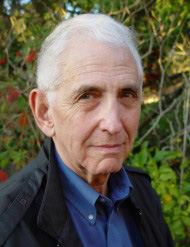
Daniel Ellsberg (1931–2023) was best known for releasing the Pentagon Papers in 1971 through the New York Times and Washington Post.
A native of Detroit, Ellsberg graduated summa cum laude with an A.B. in economics from Harvard University in 1952, studied at King's College in the University of Cambridge for a year on a Woodrow Wilson Fellowship, served as a company commander in the 2nd Marine Division of the U.S. Marine Corps for two years, and then returned to Harvard to complete his doctoral degree in economics in 1962. In 1959, he joined the RAND Corporation’s Economics Department as an analyst, and in 1964 he was recruited to serve in the Pentagon under Secretary of Defense Robert McNamara during the Johnson Administration as special assistant to Assistant Secretary of Defense for International Security Affairs John McNaughton. Following a two-year stint in Vietnam for the U.S. State Department, Ellsberg eventually returned to RAND.
In late 1969, with the assistance of his former RAND Corporation colleague Anthony Russo, Ellsberg secretly made photocopies of the classified documents to which he had access; these later became known as the Pentagon Papers. They revealed that, early on, the government had knowledge that the war as then resourced could most likely not be won. Further, as an editor of The New York Times was to write much later, these documents "demonstrated, among other things, that the Johnson Administration had systematically lied, not only to the public but also to Congress, about a subject of transcendent national interest and significance."
On June 28, 1971, two days before a Supreme Court ruling saying that a federal judge had ruled incorrectly about the right of The New York Times to publish the Pentagon Papers, Ellsberg publicly surrendered to the U.S. Attorney's Office for the District of Massachusetts in Boston. He and Russo faced charges under the Espionage Act of 1917 and other charges including theft and conspiracy, carrying a total maximum sentence of 115 years for Ellsberg, 35 years for Russo. However, due to the gross governmental misconduct and illegal evidence gathering, and the defense by Leonard Boudin and Harvard Law School professor Charles Nesson, U.S. District Judge William Matthew Byrne, Jr., dismissed all charges against Ellsberg and Russo on May 11, 1973, after the government claimed it had lost records of wiretapping against Ellsberg. Byrne ruled: "The totality of the circumstances of this case which I have only briefly sketched offend a sense of justice. The bizarre events have incurably infected the prosecution of this case."
In 1973, during the Watergate scandal, John Ehrlichman, H. R. Haldeman, Richard Kleindienst, and John Dean were forced out of office on April 30, and all would later be convicted of crimes related to Watergate. Egil Krogh later pleaded guilty to conspiracy, and White House counsel Charles Colson pleaded no contest for obstruction of justice in the burglary.
Ellsberg is the author of the books, Secrets: A Memoir of Vietnam and the Pentagon Papers, The Doomsday Machine: Confessions of a Nuclear War Planner, and Risk, Ambiguity and Decision. His scholarly articles have appeared in such journals as the Quarterly Journal of Economics, Economic Journal, and American Economic Review.
He is the recipient of the Inaugural Ron Ridenhour Courage Prize, Gandhi Peace Award, Right Livelihood Award, Dresden Peace Prize, and the Olof Palme Prize for his profound humanism and exceptional moral courage.






